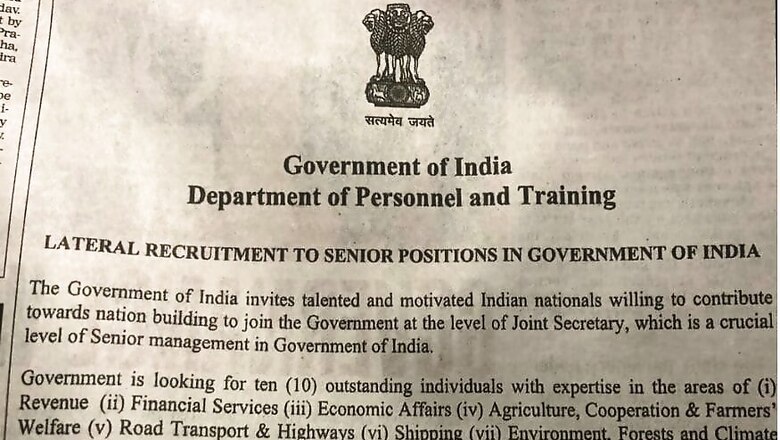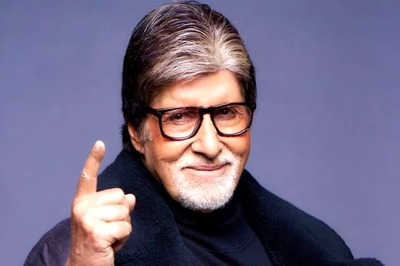
views
Prime Minister Narendra Modi can deliver “minimum government, maximum governance” only through fundamental reform of India’s machine of governance. The World Bank ranks India 91st on government effectiveness – below Rwanda. Lant Pritchett has described the Indian bureaucracy as “one of the world's top 10 biggest problems”. A 2012 report ranked India’s bureaucracy as the worst in Asia.
Of course, this is not just about our bureaucracy. Our politicians are some of the worst. Hordes of criminals are members of India’s parliaments. Most ministers I worked with in the IAS (in the first half of my 36-year career) were severely incompetent, quite unlike the superlative officers and ministers I have advised in Victoria, Australia since 2001.
Our party – Swarna Bharat Party, India’s only liberal party – considers that no further economic reforms can succeed without a radical improvement of India’s governance system. First, we need to reform the electoral system through state funding of elections on a per vote basis. Unless we are assured that our politicians are honest and competent, we can’t let them select senior bureaucrats from the open market – something needed in order to build an accountable bureaucracy.
Unfortunately, while PM Modi flagged electoral reforms a couple of years ago, nothing has so far come of it. Without first reforming the electoral system, many people will question the motives of the PM’s lateral entry initiative.
After that, we need to overhaul the bureaucracy. The lateral entry initiative will come to naught if it does not lead to the abolition of all tenured civil services, including the IAS and replacement with a modern machine of government. Our party has congratulated PM Modi on the basis that he is serious about delivering good governance. India’s goal must be open market recruitment for all positions and the ability to instantly fire officials for any performance or integrity issues.
Sardar Patel was right to continue with the colonial system of bureaucracy at the time of India’s independence but he was wrong to shelter it through Part 14 of the Constitution. We are the only major democracy in the world to give its bureaucracy such extreme protection in the country’s Constitution. Article 311 protections ensure that even blatantly corrupt officers cannot be dismissed, leave alone the incompetent.
It would be fair to say that the Constitutional rights of India’s bureaucrats are much stronger than the property rights of its citizens. There are IAS officers with thousands of pages of documented evidence of corruption against them, who manage to remain scot-free on the basis of these protections. We are at least able to throw out our bad politicians every five years, but bad bureaucrats are there for life .
Further, driven by misguided socialist goals, successive governments kept reducing the salaries of senior bureaucrats after independence. Even today, these are not market-tested, although better than they were in 1982 when I joined the IAS. I must hasten to add that high salaries are not a panacea and must be linked to the ability to fire instantly for non-performance.
Our party is committed to repealing Part 14 of the Constitution and replacing it with a Public Administration Act. In particular, we believe that any protections for bureaucrats must not exceed the general protections available to ordinary citizens under the Constitution.
All tenured services (including all-India services) would be disbanded in our model, subject to appropriate transitional arrangements. Open recruitment would take place for each job at each level, starting from the top. First, departmental secretaries would be hired by the Prime Minister or relevant Chief Minister on three to five-year contracts. They would be paid competitively but would be subject to instantaneous termination for poor performance. Senior bureaucrats are walked out of their office in Australia within minutes of their termination: they get one month’s salary in lieu. Incompetent or corrupt persons can’t last five minutes in such a system.
Departmental secretaries would then hire the next level of officers – and so on, down the line. All executives would be on a contract. Below that, appointments would be permanent but only for a specific role. All jobs would be subject to performance, all employees fully accountable to their manager. Similar reforms would be needed at the local government level.
PM Modi’s lateral entry initiative meets only a small part of our party’s reform recommendations. These 10 Joint Secretary jobs will be on a contract that can be terminated with three month notice on either side. That is good. But I suspect any dismissals will likely be tested in court. It is essential for Mr Modi to enact a Public Administration Act to avoid censure by courts. More problematically, the salary being offered is too low. Contractual jobs must necessarily pay more than tenured jobs.
The open-market system is ultimately all about specialisation and accountability. Each job needs to be advertised individually. The job description in the current round of lateral entry does not provide a clear role description. Thus, only expert economists must be hired to advise on economic policy.
One can only hope that PM Modi will follow up this initial – rather feeble and tentative – reform with a full-blown suite of governance reforms. He has already squandered four years and the country may not give him a second chance. I strongly commend our party’s manifesto which provides extensive details for all essential reforms.
(Sanjeev Sabhlok is a former civil servant. Views are personal)



















Comments
0 comment